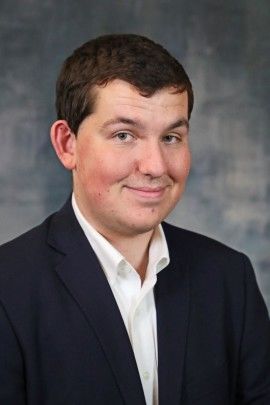Alumni Profile: Caleb Smith
How Stanford prepared one alum to work in local government
Stanford alumnus Caleb Smith shares how his time on the Farm helped propel him into a career in local government.
By Alex Kekauoha
Stanford alumnus Caleb Smith isn’t reluctant to tout the benefits of working in local government. As an employee of San Mateo County, he says one of the greatest advantages is being focused on practical matters and seeing the fruits of his labor.

“In local government, you’re often close to the impact,” Smith said. “A lot of the programs you’re working on, you either know people are benefiting from them or you’ll clearly understand the benefits of what you’re doing.”
Smith graduated from Stanford in 2017 with a bachelor’s degree in public policy, and a master’s degree in public policy the following year. He said the skills he developed and connections he made at Stanford – including through the Bill Lane Center for the American West (BLC) – were crucial to launching his career. He also encourages students to consider public service careers at the city and county levels.
“For people who are interested in public service, it’s really good to take a look at local government,” he said. “There are a lot of really innovative things that happen in that sector.”
Building a career
Smith’s path to a local government career started around his sophomore year at Stanford, which is when he declared a public policy major. He later sought out the guidance of Bruce Cain, professor of political science and director of the BLC.
“I reached out to Bruce Cain and said, ‘I’m interested in local government and public policy. Could we talk about maybe me being your advisee?’ and he was game,” Smith recalled.
In addition to receiving academic and professional guidance from Cain, Smith took one of his courses on political reform and later served as a teaching assistant for Cain’s graduate level course about political analysis.
Smith also completed the public policy program’s practicum with Preeti Hehmeyer, the BLC’s former associate director. In that course, Smith and his classmates worked with city managers from Palo Alto, Menlo Park, Redwood City and Mountain View, who wanted to build a bicycle corridor connecting the four cities. For their part, the students were tasked with finding a revenue source for the project. The course, Smith said, was a glimpse into the kind of work that municipal employees do every day.
Smith also completed two local government-related internships that were supported by Stanford. The first was with the city of Fremont, where Smith worked on fiscal issues. The second was in his hometown of Oakland, where he worked in the office of Mayor Libby Schaaf. In that role, Smith helped research and develop affordable housing programs.
“That was a good experience,” he said. “I learned a lot and some of the work I did there had some definite real-world consequences.”
At Stanford, Smith was also active with campus media organizations. He was the general manager of the university’s radio station, KZSU, which he said was great leadership experience. He also was a writer and desk editor for The Stanford Daily, which helped prepare him for policy writing.
“Being able to take a bunch of information, consolidate it down into something that’s short and simple is a really useful skill. It’s a lot like writing a policy memo,” he said. “Anyone who’s written a significant number of articles for The Daily and learned the right way to do it will probably be a good fit for local government.”
Current job
Today, Smith is a sustainability coordinator for San Mateo County, working on affordable housing issues. He’s also helped develop a program called Great Plates Delivered, which delivers meals from local restaurants to seniors who would otherwise have difficulty accessing food. To date, the program has worked with more than 80 restaurants and served meals to more than 3,400 seniors. Smith said the program, which was launched in response to the COVID-19 pandemic, is an example of why he pursued a career in local government.
“I actually get to see thank-you notes from seniors and I get to talk to the restaurants whose businesses our program quite literally saved,” he said. “It’s that immediacy of impact that I find extremely attractive.”
To students thinking about which academic and career paths to pursue, he encourages them to explore their interests and not worry that their major will dictate their future, adding that he works alongside people with diverse academic backgrounds. He also encourages students to consider taking courses in local government because the knowledge and skills acquired in those classes are valuable, regardless of what field they ultimately enter.
“Local government is omnipresent in your life and just taking a class or two about it can be incredibly useful so you can be an active member of your community going forward,” he said.